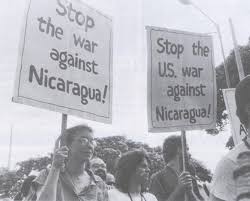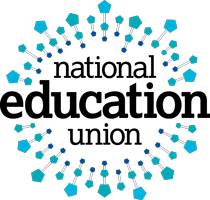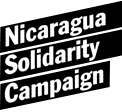US aggression once more threatens Nicaraguan democracy and social progress
NSCAG News |
on: Wednesday, 26 April 2017

Demonstrations against contra war in the 80s
In a move ominously reminiscent of US acts of aggression against Nicaragua in the 1980s, when the United States administration waged a brutal war (known as the contra war) against Nicaragua, legislation was re-introduced on 5 April 2017 to the US House of Representatives that would, if enacted, profoundly destabilise Nicaragua. Almost 40 years after a war that cost 30,000 lives, the United States is once again threatening Nicaragua with another kind of war, this time an economic war which would severely undermine the widely praised progress of the Nicaraguan government in reducing high levels of poverty.
Known as the NICA Act (Nicaraguan Investment Conditionality Act), this legislation would mean that the US, who effectively have veto powers within international lending institutions, could block all loans from the World Bank and Inter-American Development Bank to Nicaragua. Currently running at US$250 million annually, these loans are being invested in education, social programmes, electrification, roads and other infrastructure initiatives.
The NICA Act is a rehash of legislation approved by the US House of Representatives in September 2016. This legislation states that the US will oppose loans to Nicaragua unless Nicaragua promotes democracy, strengthens the rule of law, and respects freedom of expression to the satisfaction of the US State Department. However, because of the US elections, there was insufficient time for this legislation to be approved by the Senate and signed off by the President.
On 28 February, 2017 the Organisation of American States (OAS) signed a Memorandum of Understanding with the government of Nicaragua that establishes the terms of reference for an OAS mission to Nicaragua. The re-introduction of a more severe version of the NICA Act on 5 April by Ileana Ros-Lehtinen and Albio Sires flies in the face of this initiative by the OAS (of which the US is a member state).
Since 2007, Nicaragua has undergone a remarkable transformation under the leadership of Daniel Ortega and the FSLN Government. Health and education are free and maternal mortality has been halved. Poverty and extreme poverty have also been halved and the country has been praised by the UN for achieving the Millennium Development Goal of halving malnutrition. The country has been declared illiteracy free by UNESCO and currently enjoys growth rates which are among the best in Latin America. It enjoys peace and stability and has been declared the safest country in Central America by the United Nations Development Programme UNDP. In 2016, Daniel Ortega was re-elected as President with 72% of the popular vote.
The NICA Act has met with unanimous condemnation in Nicaragua by the government, trade unions, the National Assembly, the private sector and all political parties. A National Assembly statement points out that the Act would only serve to destabilise the country. It has also been criticised as counterproductive by the private sector represented in the Nicaraguan Chamber of Commerce. As Nicaraguan economist Mauricio Peralta points out: “Impoverishing a country will not contribute to democracy”.
Nicaraguan Vice President Rosario Murillo has labelled the Nica Act as a “reactionary and interventionist” move that seeks to “undermine the right of Nicaragua to continue developing the socialist model.”





